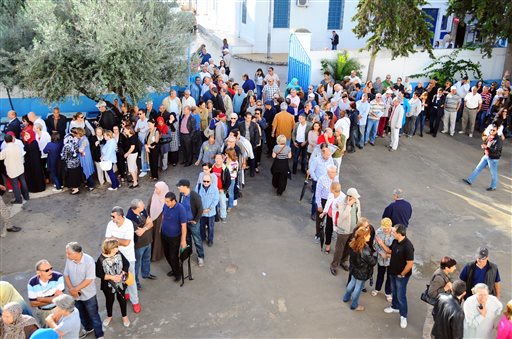TUNIS, Tunisia (AP) — Tunisia’s main secular opposition party was claiming victory on Monday over once dominant Islamists in the country’s historic parliamentary elections.
Partial results from the official election commission are expected to be released throughout the day Monday, but the Nida Tunis (Tunis Calls) party cited exit polls to say it has won more seats than any other party in the 217-member parliament.
“According to the information we have, we should have around 80 seats,” said Aida Klibi, a party spokeswoman.
The assertion was based in part on exit polls conducted by two Tunisian polling companies giving Nida Tunis 37 percent of the seats compared to 26 percent for the moderate Islamist Ennahda (Renaissance Party), which had dominated previous elections.
If the polls are confirmed by the election commission, it would be a dramatic reversal for Ennahda, which had held 42 percent of the seats in the interim parliament and ruled the country for two stormy years in a coalition with two other liberal parties.
Ennahda acknowledged that Nida Tunis “probably” won more seats than any other party, but said information about the results was still flowing in.
“We have a picture forming and we are not as optimistic as last night,” said Yusra Ghannouchi, a spokeswoman for the party.
The election, in which 60 percent of Tunisia’s 5.2 million registered voters participated, will produce the nation’s first five-year parliament following the country’s 2011 Arab Spring revolt. Presidential elections are set for late November.
Created as an explicit counter balance to the Islamists after their 2011 election victory, Nida Tunis includes businessmen, trade unionists and many politicians from the deposed dictator Zine El Abidine Ben Ali’s government.
They seek to evoke the heritage of Tunisia’s first post-independence president, Habib Bourguiba, with his focus on education and modernization, while playing down the one-party state that Tunisia had been for half a century.
During the two years the Ennahda-led government held power, the country was battered by rising inflation, a weak economy and the growing power of radical Islamists that mounted attacks on politicians and soldiers.
The party was criticized for not solving economy problems and being too soft on radicals.
While the Islamist-led government eventually stepped down at the end of 2013 in favor of a technocratic Cabinet, it did oversee the passing of a new constitution described as the most progressive in the region.
_____
Associated Press writer Bouazza ben Bouazza contributed to this report.

COMMENTS
Please let us know if you're having issues with commenting.